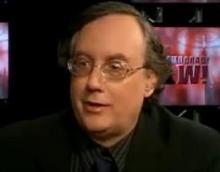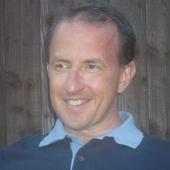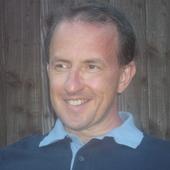Science and Religion: Never the Twain Shall Meet
A recent HuffPost blog authored by Max Tegmark claims that religion and science are "closer than you think." The statistic provided as support to the claim is an MIT survey that shows only 11 percent of Americans belong to religions that "openly reject" evolution or modern cosmology, specifically the Big Bang theory. But the report draws a false conclusion by asking the wrong question. The real problem is that 89 percent of Americans wrongly believe that evolution and cosmology are compatible with religious teachings. They are forcing a round peg into a square hole. Curiously, the 11 percent are closer to a fundamental truth: religion and science can never be reconciled, any more than oil can be made miscible in water. You can try by creating ultrafine oil and water mixtures, but you still have an emulsion, not a solution. Equally, no matter how much effort you put into reconciling religion and science the best you'll have in the end is an incompatible mixture.
How and Why
Here is the fundamental and irreconcilable conflict between the two: science searches for mechanisms and the answer to "how" the universe functions, with no appeal to higher purpose, without assuming the existence of such purpose. Religion seeks meaning and the answer to "why" the world is as we know it, based on the unquestioned assumption that such meaning and purpose exist. The two worldviews could not be further apart.
Unlike scientific claims, beliefs cannot be arbitrated to determine which is valid because there is no objective basis on which to compare one set of beliefs to another. Those two world views are not closer than we think; they are as far apart as could possibly be imagined.
Religion and science are incompatible at every level. The two seek different answers to separate questions using fundamentally and inherently incompatible methods. Nothing can truly bring the two together without sacrificing intellectual honesty.
For centuries people have attempted in vain to reconcile faith and reason. The Pontifical Academy of Sciences was founded in 1936 by the Vatican to promote scientific progress compatible with the Church's teachings. Here on the pages of the Huffington Post, Jeffrey Small argued that science and religion have common ground. Others writing for the Post make similar appeals, including the most recent by Tegmark. Jonathan Dudley claims the Christian faith requires accepting evolution. Dudley says that "Christians must accept sound science, not because they don't believe God created the world, but precisely because they do." The sentiment is similar to what famous geneticist Francis Collins said: "When something new is revealed about the human genome, I experience a feeling of awe at the realization that humanity now knows something only God knew before. I am unaware of any irreconcilable conflict between scientific knowledge about evolution and the idea of a creator God; why couldn't God have used the mechanism of evolution to create?"
But these appeals to reconcile science and religion are utterly hopeless, just wishful thinking and faith that the absurdities of religion can be shoehorned into the realities of science. It is not possible. As science explains ever-more complex natural phenomena, the need to invoke god to understand daily events and the physical world diminishes. God becomes confined to "gaps" in scientific knowledge, diminishing in stature with each great advance of human knowledge. Forget not that for 1500 years the faithful were told that god made earth the center of the universe, and that the sun orbited our planet. People were burned alive for questioning this orthodoxy. The "god of the gaps" has become an increasingly trivial figure as science narrows the space in which the ignorance that supports god can thrive. The proper response to the overwhelming evidence for evolution is to accept that the ideas of religion have failed, rather than to try desperately to bridge an ever-widening chasm. God has been reduced to what Stephen Hawking and Richard Dawkins don't know.
Science can tell us that the Earth rotates counterclockwise (if we're looking down on the North Pole from space). No purpose exists in that fact. The "why" here answers a mechanical question based on history; that particular direction of rotation is a consequence of how the original gases and debris were orbiting the sun prior to coalescing into our planet. Religion might ask "why" God had a yen for counterclockwise, but that question is outside the realm of and irrelevant to the science in question, if such a question is valid at all.
Those who attempt to reconcile religion and faith often appeal to two ideas: 1) without religion the search for objective knowledge using reason and science is an empty pursuit, devoid of meaning and morality; and 2) science is not infallible and scientists disagree among themselves. Let's tackle the first one first.
Morality, Religion and Science
Science can postulate and study the hypothesis that morals are not derived from religion, nor god's grant of free will, but instead arise from inherent characteristics embedded in human nature as a consequence of our sociality. What we view as moral behaviors -- kindness, reciprocity, honesty, respect for others -- are social norms that evolved in the context of a highly social animal living in large groups. The evolution of these social norms enabled a feeble creature to overcome physical limitations through effective cooperation. Perhaps morality is a biological necessity and a consequence of human development. Perhaps religion has masked and corrupted these natural characteristics with a false morality that converts intrinsic human benevolence and generosity into cheap commodities to be purchased with coupons for heaven. Good behavior is not encouraged as a means of advancing our humanity, but instead is enforced with threats of eternal damnation.
One prominent characteristic of human beings is sociality. Functioning as a group in many circumstances conveys significant advantages on members of the group. Associated with sociality is altruism, which is sacrificial behavior that in some way promotes the propagation of the genes of the altruistic individual, usually by aiding the survival of a close relative sharing some common genetic stock. The ultimate altruistic behavior would be dying for the sake of another's survival. An uncle getting in harm's way to protect a nephew is an example. Social cooperation and altruism are significant factors in the success of our species, a fact that underlines the biological basis for a natural morality as a defining and adaptive human characteristic.
In contrast, a religious code of ethics based on personal reward for behaving morally or eternal punishment for not doing so leads to a flawed morality with long-term and serious consequences for humankind. Many of society's ills, including violent intolerance of our fellow humans, result to a considerable degree from religious morality based on fear of the unknown and hopes for immortality. Behaving morally for no reward and in no fear of punishment, but because we have the capability of being moral creatures, is one of the traits that can define humanity. Pursuit of such a natural ethic is a means of augmenting what is good in humans and minimizing elements of our darker side.
Christianity has had a 2000 year run to prove itself an effective means of teaching morality. The experiment has failed. We need another approach. We can choose a path unique to humans by elevating ourselves above the common fate of other species. We can choose a natural ethic. Those who do embrace a natural ethic will find a certain satisfaction derived from knowing one's place in the universe. Amazing clarity is achieved in realizing that life is not controlled by some unseen and mysterious god, but by an individual's power to make decisions, and a personal choice to be moral. There is tremendous joy in understanding that purpose and meaning in life are self-derived, and that these precious commodities are not some gift from above that can be taken away arbitrarily by a wrathful deity working in mysterious ways. With a natural ethic we are the masters of our own fate. Nothing is more powerful, or more satisfying.
Perhaps theses idea are wrong; time, advances in knowledge and further investigation may eventually tell. But the same cannot be said for religious claims about morality. Those cannot be investigated. For those who believe that morality is derived from god, there are no further investigations to the question. And therein we find the biggest and most obvious irreconcilable difference between faith and reason.
Science and Fallibility
We are told that since science and faith are both fallible, both are equally valid approaches to understanding the world and ourselves. Here is what Jeffrey Small says about this:
"Bias, preconceived ideas, academic politics, ego and resistance to change are ever-present in scientific and academic communities and often result in institutional opposition to new theories, especially ground-breaking ones. Many scientists initially resisted Copernicus, Kepler and Galileo because they presented a new paradigm of the universe."
Well, exactly! What this proves is that over time, science is self-correcting while faith is not. While we all know now, due to science, that the earth orbits the sun, the Church is still fighting the battle with Galileo. Even today in the 21st century, the Church claims that Galileo shares blame because he made unproven assertions. Unproven assertions! The best the Pope could muster was that he regretted the "tragic mutual incomprehension" that had caused Galileo to suffer. As the new millennium settles in, the Church still claims that Galileo was wrong. The dissonance between Scripture and fact is not a problem relegated to earlier centuries, but remains relevant today. Science is indeed fallible, and scientists suffer from all the usual human foibles. But reproducibility, scrutiny from other scientists, the drive for new knowledge, the glory of overturning orthodoxy, all drive science to a better understanding of an objective truth or our best approximation of it; this method of understanding the world is inherently incompatible with faith. Faith cannot be contested: I believe, therefore it is true. All scientific claims are by nature contestable. Those differences cannot be reconciled.
In reality we need to turn this argument about fallibility on its head. Science never claims to be infallible. There would be no need for more research if scientists believed they had all the answers, and all of them right. But god by definition is infallible. And yet. The Bible's clear statement about age of the earth, off by more than 4 billion years, is one example of an important factual error. Sure, maybe this is a mistake of human interpretation of divine will. But with each new discovery proving a Biblical assertion wrong, the Church retreats to the safety of errors in interpretation or dismissing the discrepancy as unimportant. Yet the ever-accumulating factual mistakes must call into question the certainty with which the Church claims that god, or the Bible, is infallible, since their previous insistence has proven unsubstantiated with glaring factual mistakes. These doubts about infallibility apply, too, to the Church's teachings on morality. If the bible is the literal word of god, then god has clearly blown it. If the bible is a flawed interpretation of god's will, then the conclusions about morality can be equally flawed. The issue of fallibility is a problem for the faithful, not for science and reason.
Religion and Politics
The incompatibility between faith and reason come into full glory in the political arena. And nowhere is that made more clear than the rush toward willful ignorance in the on the Republican right. A potential presidential candidate cannot be taken seriously by the right unless one questions evolution, denounces the idea that climate change is real and human-induced and attacks the protection of our natural resources as a liberal conspiracy. The fight against evolution is just the modern day version of the Church's attacks on Galileo. We can demonstrate evolution in a Petri dish; it has been proven across multiple fields of science including genetics, biogeography, and paleontology. Even the Pope in 1996 grudgingly admitted that evolution is "more than just a theory."
With faith unconstrained by reason, we suffer a House Science Committee led by and populated with representatives who openly question evolution and climate change. Vice Chair Rep. James Sensenbrenner (R-WI) dismisses climate change as a "massive international scientific fraud" which is an example of "scientific fascism." Rep. Dana Rohrabacher (R-CA) believes "dinosaur flatulence" might explain global warming. Outgoing chairman Rep. Ralph Hall (R-TX) said, "I'm really more fearful of freezing. And I don't have any science to prove that. But we have a lot of science that tells us they're not basing it on real scientific facts." The new chairman, Rep. Lamar Smith (R-TX), called scientists "global warming alarmists." Let's be clear: this is faith, unshackled from the inconvenience of reality. This is belief, and belief cannot be challenged - if I believe it, it is true, no matter how much contrary evidence is presented. That is incompatible with reason.
That Dog Won't Hunt
So, you still want to try to reconcile faith and reason? All monotheistic believers reject all gods, except one. Christians, Muslims and Jews are united in rejecting all the Greek elder gods Cronus, Gaea, Uranus, Rhea, Oceanus, Tethys, Hyperion, Mnemosyne, Themis, Iapetus, Coeus, Crius, Phoebe, Thea, Prometheus, Epimetheus, Atlas, Metis, and Dione. All deny the existence of the Greek Olympic gods Zeus, Poseidon, Hades, Hestia, Hera, Ares, Athena, Apollo, Aphrodite, Hermes, Artemis, and Hephaestus. All major religions today dismiss as nothing but myth the Roman gods Jupiter, Juno, Neptune, Pluto, Apollo, Diana, Mars, Venus, Cupid, Mercury, Minerva, Ceres, Proserpine, Vulcan, Bacchus, Saturn, Vesta, Janus, Uranus and Maia.
Yet this roster of gods was real to multiple thousands of people for thousands of years, every bit as real as the one god worshiped by Christians, Muslims and Jews today. As Stanislaw Lec said, all gods were immortal -- that is until they were no longer gods worshiped by the masses. These Greek and Roman gods were the subject of daily pleas, prayers and sacrifice, and the guiding force for much daily ritual. These mighty powers stood for millennia, ruling over their followers for a period of time that greatly exceeds all of Christianity. Yet these gods are now demoted to nothing more glorious than a good story. The Lec quote beautifully captures the reality that the one uniting us all is our atheism. Like all believers today, the Pope, every Evangelical Christian, every Catholic, every Jew, every Muslim rejects the existences of Zeus, Cronus, Jupiter and all the other Greek and Roman gods. We all agree completely that those gods don't exist; we only differ by one god. They reject 100 gods, I reject 101 gods. Using their exact logic to deny the existence of Zeus, I apply to their one remaining god. We're just quibbling about numbers.
And yet the inherent conflict between science and religion will not allow us to accept this simple reality: the god of Abraham is no more real than Zeus. Science need not prove god does not exist, any more than we must prove Zeus is not real. Theists must prove that he does exist. If someone claims there is an invisible pink elephant in the room, I am not obliged to prove him wrong; he is required to prove his claim correct. But being faith bases, religion can offer no such proof. Hence the irreconcilable incompatibility between science and religion. Science and religion are not closer than we think; they are as far apart as possible.
Book Introduction:
Beyond Cosmic Dice: Moral Life in a Random World
by Jeff Schweitzer and Giuseppe Notarbartolo di Sciara
Jeff Schweitzer spent much of his youth underwater pursuing his lifelong fascination with marine life. He obtained his doctorate from Scripps Institution of Oceanography through his neurobehavioral studies of sharks and rays. He has published in an eclectic range of fields, including neurobiology, marine science, international development, environmental protection and aviation. Jeff and his wife live in central Texas, moving there after retiring from the White House as Assistant Director for International Science and Technology.
Giuseppe Notarbartolo di Sciara is an evolutionary biologist with a doctorate from the University of California. He serves as a marine policy advisor to various national and international bodies, and has recently represented Italy in multilateral environmental negotiations. Through appearances on television and radio, and the publication of articles and books, he has been striving to increase public awareness of marine conservation. Giuseppe lives with his family in Northern Italy.
This article is brought to you by the author who owns the copyright to the text.
Should you want to support the author’s creative work you can use the PayPal “Donate” button below.
Your donation is a transaction between you and the author. The proceeds go directly to the author’s PayPal account in full less PayPal’s commission.
Facts & Arts neither receives information about you, nor of your donation, nor does Facts & Arts receive a commission.
Facts & Arts does not pay the author, nor takes paid by the author, for the posting of the author's material on Facts & Arts. Facts & Arts finances its operations by selling advertising space.

















